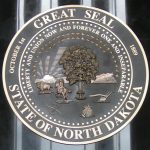Legislative Overview ~ April 10, 2025

In the North Dakota Legislature floor sessions today, both the House and Senate convened to address various legislative matters including consideration of amendments, second readings of bills and resolutions, and discussions on bills from the other chamber. Key items on the agenda involve bills recommended for passage by committees, such as SB 2251 (House Appropriations) and SB 2204 (House Industry, Business and Labor), as well as reconsideration of a gubernatorial veto on SB 2261 by the House Finance and Taxation Committee
Additionally, the House reviewed bills across multiple orders, including HB 1140 and HB 1205, which have already passed with strong support. The Senate focused on similar legislative priorities, ensuring progress on critical measures. The sessions provide an opportunity for legislators to finalize decisions on pending bills and resolutions before the end of the legislative period, which is scheduled to conclude the first week in May.
Here is a summary of what took place during today’s floor sessions:
7 Bills Passed in the Senate and awaiting Governor’s Signature: HB1018, HB1019, HB1144, HB1181, HB1417, HB1485, & HB1600. Those which were failed include: HB1450.
13 Bills Passed in the House and awaiting Governor’s Signature: HB1109, SB2020, SB2036, SB2037, SB2082, SB2213, SB2226, SB2230, SB2234, SB2243, SB2271, SB2396, & SB2399. There were none which failed.
The Bills we are tracking regarding the business world include:
SB2113: https://ndlegis.gov/assembly/69-2025/regular/documents/25-8094-06000.pdf
This Bill seeks to establish new requirements for mathematics instruction in North Dakota schools. It mandates evidence-based curriculum, professional development for teachers, and early screening for dyscalculia in students. The bill also outlines reporting obligations to the state superintendent and legislative management. Schools must ensure qualified teachers and adopt state-approved instructional materials. An appropriation of $1.2 million is allocated to support implementation efforts. The bill enlarges government oversight but does not impose restrictions on individual rights.
SB2214: https://ndlegis.gov/assembly/69-2025/regular/documents/25-0555-02000.pdf
This Bill proposes transferring the duties of the North Dakota Securities Commissioner to the Insurance Commissioner. The bill amends various sections of the North Dakota Century Code to reflect this change, consolidating regulatory oversight within the insurance department. It affects financial institutions, securities professionals, and regulatory compliance processes by centralizing authority. The bill enlarges government oversight by expanding the responsibilities of the Insurance Commissioner. It would eliminate the standalone position of the Securities Commissioner and transfer all related duties and responsibilities to the Insurance Commissioner’s office. This restructuring consolidates regulatory oversight within the insurance department, aiming to streamline administrative processes and improve efficiency. Affected stakeholders include financial institutions, investment firms, and individuals involved in securities regulation.
SB2221: https://ndlegis.gov/assembly/69-2025/regular/documents/25-0638-03000.pdf
This Bill amends North Dakota’s skilled workforce student loan repayment and scholarship programs to include individuals who have completed a Master of Science degree in nursing while teaching four clinical credits per year. It also clarifies eligibility requirements for educational programs that qualify for these initiatives, ensuring they align with high-demand occupations in the state. The bill impacts nursing professionals, educational institutions, and workforce development programs.
SB2251: https://ndlegis.gov/assembly/69-2025/regular/documents/25-0851-03000.pdf
This Bill proposes changes to the auditing process conducted by the North Dakota State Auditor’s office. It revises audit charges, introduces new reporting requirements, and clarifies the use of subpoenas in audits. The bill may impact business owners, especially those interacting with state agencies, by potentially increasing transparency and accountability in financial oversight. It could impact business owners who interact with the state by potentially increasing their audit-related responsibilities and compliance requirements. The bill introduces changes to audit fees, reporting obligations, and the authority of the State Auditor to issue subpoenas. Businesses that contract with or receive funding from the state may face greater scrutiny and need to ensure thorough financial record-keeping to meet the revised audit standards. This could lead to additional administrative costs and adjustments in internal accounting practices.
~ After nearly 90 minutes of debate, House Bill 1450 was defeated in the North Dakota Senate today. This bill sought to grant parents or guardians the right to remain in the room with their child during medical appointments, ensuring transparency and parental involvement in healthcare decisions. The proposal raised significant discussion about balancing parental rights with the autonomy of medical professionals and the privacy of adolescent patients. The final vote reflected a lack of consensus, with the bill failing to secure enough support to move forward. The debate underscores the complexities surrounding parental rights in healthcare and highlights the challenges legislators face when addressing such sensitive and multifaceted issues. There were emotional testimonies on both sides. Some say it’s a social issue regarding parent’s rights and some say it’s a business issue to protect providers. Where would you fall on this topic?
Jan Wangler, Executive Director 

